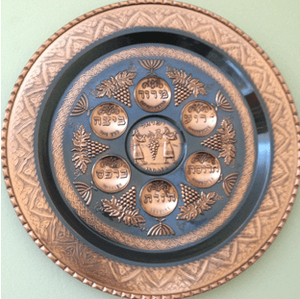How and Why We Remember
The people of a certain culture devote an entire week of each year to commemorating one of the worst parts of their history. They taste bitter things to appreciate the suffering of their ancestors. They consciously abstain from consuming bread to remind themselves what was eaten—or rather, what was not eaten. They mourn the deaths of their ancient oppressors. They drink the metaphorical tears of their forefathers and foremothers. And year after year after year, they gather around tables to recount the suffering and the humiliation and the turmoil of their own people.
You guessed it, I’m talking about Pesach, a spring festival during which Jews get together with family and friends to partake in the long and sometimes confusingly elaborate ritual of the Passover Seder. And while it is undeniably a celebration of freedom and redemption from slavery, there is a bizarre amount of emphasis placed on the slavery part of that equation.
It is important to remember that “we were once slaves in Egypt” for the same reason it is important to commemorate the Shoah or the fall of the second temple, or any other historical event that makes us cringe and shiver: to learn. Or, as the Torah puts it, to remember, “To love [the stranger] as yourself, for you were strangers in the land of Egypt.”
Many a peer has tried to convince me of the unimportance of history (which I happen to have a strong bias for, as it is a favorite subject of mine—second only to English). Why, frustrated students argue, should we be concerned with the actions and habits and desires of people who lived hundreds of years before iPhones and microwaves and sliced bread? When will it be useful to us how many wives what’s-his-face executed, or who ran for office in the election of 18 something-or-other? While I can’t say that I’m a huge fan of names and dates, I would argue that there’s a lot to be said for the importance of remembering our past.
Most students have, at some point in the course of their educational career, heard a history teacher say in one form or another that we as a society need to study history in order to learn from our mistakes. So, do we?
The World Health Organization's data indicates that, between 1990 and 2012, life expectancy in developing countries increased by an average of nine years. Harvard Psychologist Steven Pinker, author of The Better Angels of our Nature: Why Violence Has Declined, points out that the number of people killed in battle has dropped by 1,0000-fold over the centuries as civilization has developed, the number of democracies worldwide has increased from 20 in 1946 to nearly 100 now, and the number of authoritarian regimes has decreased dramatically. Murder, deaths resulting from warfare, violence within families, rapes and lynchings in the United States, discrimination against blacks and gays, capital punishment, and child abuse are all following a downward trend. Even when we take modern-day terrorism into account, the human race is still far less violent than it ever was. Pinker and other experts point to the hard work of peacekeepers to reduce war, as well as cultural changes that make violence less common.
Change, it seems, is possible.
Whether or not the improvements of our global society are a direct result of more and more knowledge about our past accruing over time and allowing us to become wiser as a species is, admittedly, debateable. But I think the case could be made that we would not be where we are today if we never took time to discuss and analyze our past. The past has the capacity make us better politicians, better peacemakers, better scientists, and better human beings.
This Passover season, let’s make sure to appreciate the whole picture. The good and the bad, the bitter herbs and the sweet charoset. And may generations to come see the full picture of our culture—the good and the bad. Next year in Jerusalem.
This piece was written as part of JWA’s Rising Voices Fellowship.







